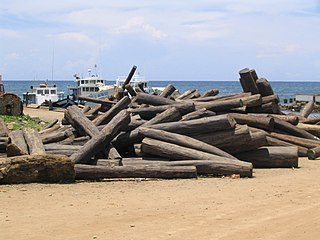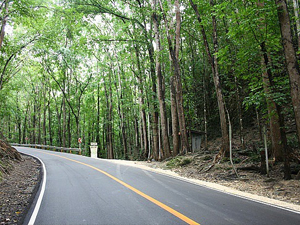The examples and perspective in this article deal primarily with India and do not represent a worldwide view of the subject.(May 2020) |
Timber mafia refers to organized crime in the field of illegal logging in timber.
The examples and perspective in this article deal primarily with India and do not represent a worldwide view of the subject.(May 2020) |
Timber mafia refers to organized crime in the field of illegal logging in timber.
Bhutan's forests have been exploited by the “timber mafia” from neighboring Assam. [1] The phenomenon has increased in the last decade. [2]
| | This section needs expansion. You can help by adding to it. (November 2013) |
Brazil has rampant illegal logging, [3] with deforestation increasing in 2013. [4] The mafia intimidate opponents, however they also have a veneer of legitimacy. [5] [6]
According to a study by the Imazon, close to 70 percent of logging in Pará was without State authorization.
Since 2003, a third of all forests in Cambodia have disappeared. The timber mafia wields huge power and have alleged links to government. [7]
Congo is also a victim of the illegal timber trade. [3]
Protected forest areas in parts of India – such as Jammu and Kashmir, Himachal Pradesh, Karnataka and Jharkhand – are vulnerable to illegal logging by timber mafias that have coopted or intimidated forestry officials, local politicians, businesses and citizenry. [8] [9] Non-state groups have joined the nexus in militancy-affected areas such as Kashmir. [10] Clear-cutting is sometimes covered-up by conniving officials who report fictitious forest fires. [11]
Many studies indicate large losses of forest cover to indiscriminate logging by timber mafias, with over a million hectares in the environs of Chhotanagpur alone being illegally transferred by the forest department directly to industrial, mining and logging companies. [12] Besides the environmental degradation, public financial losses can be substantial: One 1994 estimate of stolen timber in the state of Karnataka amounted to Rs. 10 billion (about US$230 million). [13] Veerappan was a notorious bandit who, until his shooting death by state police in 2004, specialised in illegally logging sandalwood in Karnataka and Tamil Nadu. [14]
As with coal, there have been incidents of substitution of low-grade wood for high-quality timber when the procurement of wood is authorised for government use. In an incident in 2005, officials determined that high-quality deodar wood meant for military and railway use had been substituted with lower-quality chir wood in Jammu and Kashmir state; the higher quality wood was intercepted in the process of being smuggled across the state border into Punjab. [15]
The forests of Borneo have faced illegal logging which threatens livelihood and the ecosystem. [16]
The forest industry in Romania is dominated by a “timber mafia” or a “forest mafia.” Half of all Romanian timber is illegally harvested. Those who cross the timber mafia or attempt to enforce Romania’s forest laws are targeted for retribution. [17]
Corruption is a deep rooted issue in Romania that attracts foreign timber companies such as HS Timber which has been implicated in the illegal timber trade, leading Ikea to end sourcing from them. Romania is facing European Commission scrutiny for its failure to halt illegal logging, highlighting the critical situation.

Mahogany is a straight-grained, reddish-brown timber of three tropical hardwood species of the genus Swietenia, indigenous to the Americas and part of the pantropical chinaberry family, Meliaceae. Mahogany is used commercially for a wide variety of goods, due to its coloring and durable nature. It is naturally found within the Americas, but has also been imported to plantations across Asia and Oceania. The mahogany trade may have begun as early as the 16th century and flourished in the 17th and 18th centuries. In certain countries, mahogany is considered an invasive species.

Teak is a tropical hardwood tree species in the family Lamiaceae. It is a large, deciduous tree that occurs in mixed hardwood forests. Tectona grandis has small, fragrant white flowers arranged in dense clusters (panicles) at the end of the branches. These flowers contain both types of reproductive organs. The large, papery leaves of teak trees are often hairy on the lower surface. Teak wood has a leather-like smell when it is freshly milled and is particularly valued for its durability and water resistance. The wood is used for boat building, exterior construction, veneer, furniture, carving, turnings, and various small projects.

Illegal logging is the harvest, transportation, purchase, or sale of timber in violation of laws. The harvesting procedure itself may be illegal, including using corrupt means to gain access to forests; extraction without permission, or from a protected area; the cutting down of protected species; or the extraction of timber in excess of agreed limits. Illegal logging is a driving force for a number of environmental issues such as deforestation, soil erosion and biodiversity loss which can drive larger-scale environmental crises such as climate change and other forms of environmental degradation.

Koose Munusamy Veerappan(Tamil-வீரப்பன்) was an Indian poacher, smuggler, domestic terrorist and bandit who was active for 36 years, and kidnapped major politicians for ransom. He was charged with sandalwood smuggling and poaching of elephants in the scrub lands and forests in the states of Tamil Nadu, Karnataka and Kerala. He was wanted for killing approximately 184 people, about half of whom were police officers and forest officials. He was also responsible for poaching approximately 500 of the 2000 elephants killed in the peninsular region where he was active and for smuggling ivory worth US$2.6 million and about 65 tons of sandalwood worth approximately US$22 million.
Articles on forestry topics include:.

The Changa Manga is a planted forest which includes a wildlife preserve, in the Kasur and Lahore districts of Punjab, Pakistan. It is located approximately 80 kilometers south-west of Lahore. It was once the largest man-made forest in the world but has undergone illegal deforestation at a massive scale in recent times.

Deforestation in Cambodia has increased in recent years. Cambodia is one of the world's most forest endowed countries, that was not historically widely deforested. However, massive deforestation for economic development threatens its forests and ecosystems. As of 2015, the country has one of the highest rates of deforestation in the world.

Forestry in India is a significant rural industry and a major environmental resource. India is one of the ten most forest-rich countries of the world. Together, India and 9 other countries account for 67 percent of the total forest area of the world. India's forest cover grew at 0.20% annually over 1990–2000, and has grown at the rate of 0.7% per year over 2000–2010, after decades where forest degradation was a matter of serious concern.

Mafia Raj refers to a criminalised nexus of government officials, elected politicians, business interests and other entities.

Deforestation is one of the most serious environmental issues in Sri Lanka. Sri Lanka's current forest cover as of 2017 was 29.7%. In the 1920s, the island had a 49 percent forest cover but by 2005 this had fallen by approximately 26 percent. Between 1990 and 2000, Sri Lanka lost an average of 26,800 ha of forests per year. This amounts to an average annual deforestation rate of 1.14%. Between 2000 and 2005 the rate accelerated to 1.43% per annum. However, with a long history of policy and laws towards environmental protection, deforestation rates of primary cover have decreased 35% since the end of the 1990s thanks to a strong history of conservation measures. The problem of deforestation in Sri Lanka is not as significant in the southern mountainous regions as it is in northern and lowland southern Sri Lanka, largely due to the nature of environmental protection.

HS Timber Group is an Austrian-based company operating in the wood processing industry, lumber trading and bioenergy production. It is one of the leading woodworking businesses in Europe and employs more than 2,700 people in its headquarters and seven global production units.

Illegal logging has been a problem in Madagascar for decades and is perpetuated by extreme poverty and government corruption. Often taking the form of selective logging, the trade has been driven by high international demand for expensive, fine-grained lumber such as rosewood and ebony. Historically, logging and exporting in Madagascar have been regulated by the Malagasy government, although the logging of rare hardwoods was explicitly banned from protected areas in 2000. Since then, government orders and memos have intermittently alternated between permitting and banning exports of precious woods. The most commonly cited reason for permitting exports is to salvage valuable wood from cyclone damage, although this reasoning has come under heavy scrutiny. This oscillating availability of Malagasy rosewood and other precious woods has created a market of rising and falling prices, allowing traders or "timber barons" to stockpile illegally sourced logs during periodic bans and then flood the market when the trade windows open and prices are high. Over 350,000 trees were illegally felled in Madagascar between 2010 and 2015, according to TRAFFIC.

K Vijay Kumar, IPS, is a retired IPS officer. He was the chief of the Special Task Force of Tamil Nadu that was involved in the death of the Veerappan during Operation Cocoon of 2004. He had also been the senior advisor to Home Ministry for the Left Wing Extremism areas. He served as the Advisor to the Governor of Jammu and Kashmir with Home, Forest, Ecology & Environment, Health & Medical Education, Youth Services & Sports, Hospitality & Protocol, Civil Aviation, Estates and Information portfolios. Currently he has joined back as senior security adviser in Ministry of Home Affairs in December 2018.

As in other Southeast Asian countries, deforestation in the Philippines is a major environmental issue. Over the course of the 20th century, the forest cover of the country dropped from 70 percent down to 20 percent. Based on an analysis of land use pattern maps and a road map an estimated 9.8 million hectares of forests were lost in the Philippines from 1934 to 1988.

Operation Cocoon was an operation launched by the Special Task Force of Tamil Nadu Police to capture the forest brigand Veerappan and his associates, who were dominant in Sathyamangalam Forest in the South Indian states of Tamil Nadu, Karnataka and Kerala. The operation was headed by K. Vijay Kumar, and N. K. Senthamarai Kannan.
Awan Patti Urdu: اعوان پٹی is a valley in Muzaffarabad district, Azad Kashmir, Pakistan. It is located 25 kilometres (16 mi) southeast of Muzaffarabad city, on the right bank of the Jhelum River and opposite of Garhi Dupatta.
Pandillapalli Srinivas was an Indian Forest Service officer, a Kirti Chakra recipient, who is widely considered to be one of the most outstanding figures in Indian forest conservation, served as Assistant Commander of Special Task Force(STF) to nab gangster Veerappan.

Thathri is a town and a notified area committee in Doda district in the Indian union territory of Jammu and Kashmir. Thathri valley is located in the foothills of the Himalayan mountains, about 85 km from Batote. Apart from having ample forests, the town contains many small streams flowing through its various parts. It is located on the banks of the Chenab River and the town area is spread over 1.50 sq. Km².

Nitasha Kaul is a British-Indian academic, writer and poet based in London. In addition to fiction, she writes and speaks about topics that cover the political economy, Bhutan, Kashmir, nationalism in India, gender and identity.
Forestry in Romania is an important sector of the economy and is of global significance. Half of all forestry production in Romania is the result of illegal logging.